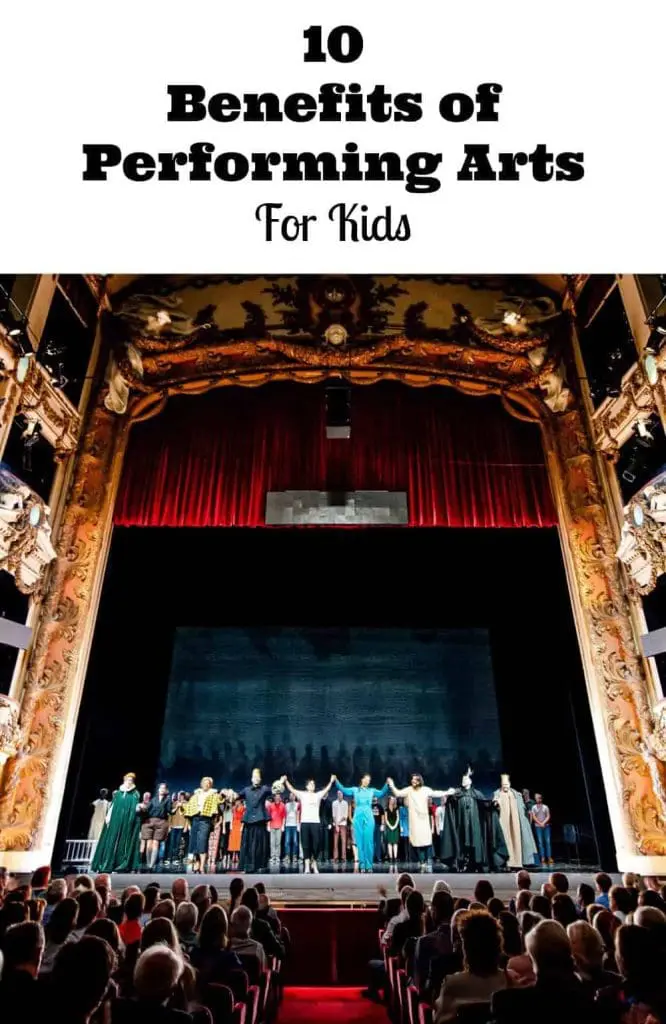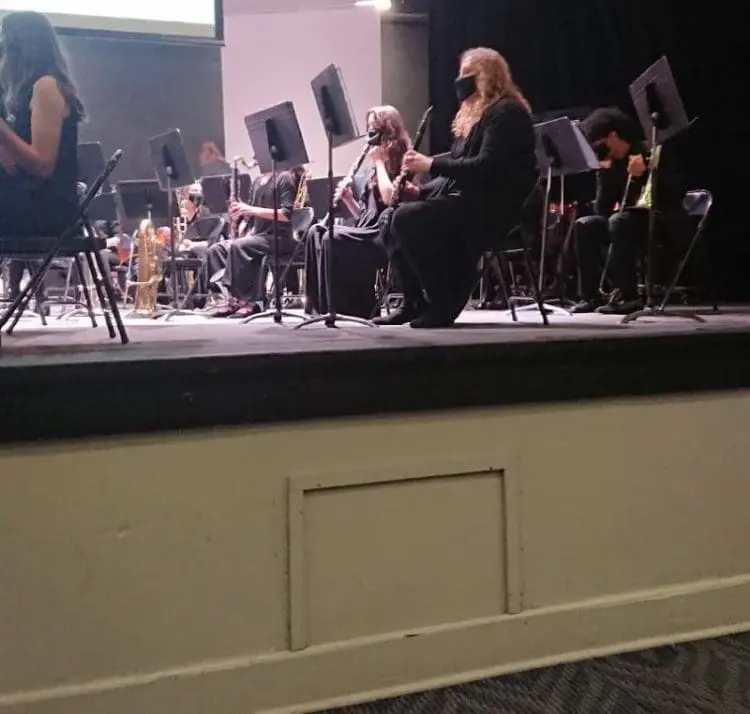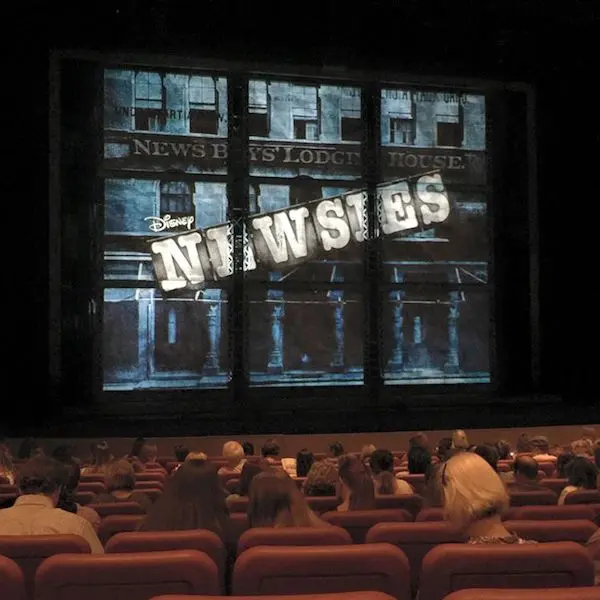My son and I go to the theatre a lot. It is great bonding time and we have so much fun. This past week we got to enjoy the Disney show “Newsies” at TPAC Performing Arts Center in Nashville. Part of the reason that we go is because I love theater (having spent so much of my life on stage) and my son loves music and dancing. But the other reason is because I feel he should learn to enjoy and appreciate the performing arts – and be involved. Plus there are so many great things he can learn and take away from performing arts theater and the show experience. Here are 10 benefits of arts education.
What are performance arts? Well, Oxford Languages defines it as “forms of creative activity that are performed in front of an audience, such as drama, music, and dance.” Another performance arts example is opera. So whether your child joins the drama club, takes art classes, acts in the theater troupe, or plays a musical instrument, they are benefiting from an arts education. Performing arts encourage many skills that will help kids in their academic and life success. Below are 10 awesome things that I believe kids can learn as they experience and grow to appreciate performance arts – no matter if they are just watching or (hopefully) participating!

The Value Of Performance Arts For Children (And Adults!)
Arts education plays a crucial role in the overall development of individuals, providing a wide range of benefits that extend beyond the realm of creativity and self-expression. Here are 10 reasons why the arts are important.
1. Creativity
Being able to think on your feet, approach tasks from different perspectives, and think outside of the box will distinguish your child from others kids. If children have practice and learn thinking creatively, creativity will come naturally to them now and in their future.
2. Confidence
The skills developed through performing arts theater, not only train you how to convincingly deliver a message, but also build the confidence you need to take command of your stage – any stage. Theatre training gives children practice stepping out of their comfort zone and allows them to make mistakes and learn from those mistakes. This process also gives kids the confidence to perform in front of large audiences.
3. Problem Solving
Artistic creations are born through the solving of problems. How do I portray a particular emotion through dance? How will my character react in this situation? Without even realizing it, kids who participate in the arts are consistently being challenged to solve problems. All this practice problem solving develops children’s skills in reasoning and understanding. This will help develop important problem-solving skills necessary for success in any career.
4. Perseverance
Mastering an instrument or learning to paint is not easy and it takes time. In an increasingly competitive world, where people are being asked to continually develop new skills, perseverance is essential to achieving success.
5. Focus
The ability to focus is a key skill developed through ensemble and collaborative work. Keeping a balance between listening and contributing involves a great deal of concentration and focus. It requires children to not only think about their role, but also about how their role contributes to the big picture of what is being created.
6. Non-Verbal Communication
Through experiences in theater and dance education, children learn body language and physical expression. They experience different ways of moving and learn how those movements communicate different emotions. Broadway shows like CATS, are full of movement and choreography and kids naturally find that interesting and entertaining.
7. Receiving Constructive Feedback
Children learn that feedback and direction are part of learning and life. It is not something to be offended by or to take personally – it is something helpful. Performing arts theater helps them grow, learn, and improve.
8. Collaboration
Most arts disciplines are collaborative in nature. Through the arts, children practice working together, sharing responsibility, and compromising with others to accomplish a common goal. When a child has a part in a music ensemble, or a theater or dance production, they begin to understand that their contribution is necessary for the success of the group. Through these experiences children gain confidence and start to learn that their contributions have value even if they don’t have the biggest role.

9. Dedication
When kids get to practice following through with artistic endeavors, they learn to associate dedication with a feeling of accomplishment. They practice developing healthy work habits of being on time for rehearsals and performances, respecting the contributions of others, and putting effort into the success of the final piece. In the performing arts, the reward for dedication is the great feeling of an audience’s applause that comes rushing over you, making all the effort worthwhile.
10. Accountability
When children practice creating something collaboratively they get used to the idea that their actions affect other people. They learn that when they are not prepared or on-time, that other people suffer. Through the arts, children also learn that it is important to admit that you made a mistake and take responsibility for it. Because mistakes are a regular part of the process of learning in the arts, children begin to see that mistakes happen. They learn to acknowledge them, they learn that it is ok, they learn from them, and move on.
Conclusion
The value of the performance arts in teaching children life lessons should not be overlooked. An arts education contributes to holistic development, fostering cognitive, emotional, and social skills that are valuable throughout life. It nurtures creativity, critical thinking, and a well-rounded perspective, enriching the lives of individuals and communities. Do you feel like performing arts theater has been helpful to your children?
Rob Youngblood is an Emmy Award Winning TV Host, Keynote Speaker, Communications Coach, and Single Dad. Basically – A Guy Who Talks for a Living! You can also follow him on Twitter.
Related Posts:
Make a Puppet Show And Puppet Theater



angela@spinachtiger says
When Marshall got one line to say in the school play, we were all so worried because he’s so shy, but then we realized it would help him and it did. He did great.
Mariella Gambardella says
Great article Scarlet, I agree 100% with your views. I live in Madrid, Spain and although the city is full of great theaters for children and adults, there is still the misconception that theaters and shows in general are an activity just for adults. Unfortunately I know quite a number of parents who are often rather surprised when I invite their family to come and watch a kids show with us, they think their children (4-6 years old, and sometimes older) are too young to go to a theater or a storytelling, even if the show is intended exactly to the age of their own children. I think passion for arts must be cultivated from an early age, in the same way as, for example, the passion for reading. Hopefully your article will be read by many parents and they will feel more and more motivated in the future to take their children to watch shows. Thank you Scarlet!